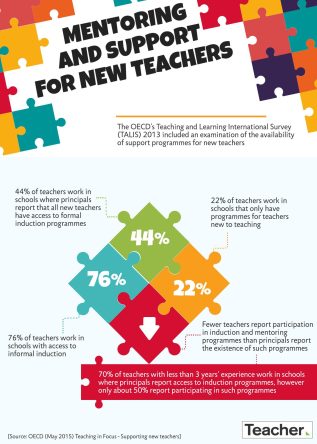Coaching and mentoring conversations that have a deliberate aim require a solid foundation. Here, Professor Kathryn Moyle expands on the steps that a school can take to successfully implement the process.
Seven school principals located in a variety of remote, urban contexts in the Northern Territory, chose to use coaching and/or mentoring conversations in 2014 as part of their respective school improvement agendas.
To support their in-school approaches, last year these principals participated in a program of semi-structured conversations to reflect on how they considered their approaches were or were not working, and why. They are continuing this program in 2015. Below are some of the common themes that emerged.
Be focused
The main focus of coaching and mentoring conversations for school improvement is to build the competency and capability of teachers, so that they can take steps towards achieving the school's strategic vision and priorities in the curriculum, teaching and learning, and assessment, and can effectively make judgments about students' progress and outcomes.
When coaching and mentoring approaches to school improvement are valued they are embedded into performance and school development policies. This means that performance development plans are explicitly linked to coaching and mentoring and school improvement.
Coaching and mentoring conversations are premised on a shared understanding by the principal and teachers, of the priorities within the school improvement agenda that is being pursued. This approach to school improvement requires an environment of trust and a culture of ongoing or continuous learning and risk-taking by the school leadership and staff.
Open-ended questions can be used to structure the conversations. These questions should require the teacher to undertake some personal reflection, and can be similar to the following:
- What are your students learning?
- How are you doing?
- How do you know?
- What are your criteria for success?
- How can you improve?
- Where do you go for help?
- What professional learning do you think you require?
Some steps that can be used for coaching and mentoring conversations for school improvement are further expanded below.
Lay the foundations
First, make sure you have the following in place:
- Commitment by the school leadership to use coaching or mentoring strategies to build the capacity of the school staff;
- The completion of an accredited coaching or mentoring training program by the principal and the leadership team;
- Collegiality among the staff and between members of the leadership team and teachers;
- Clear pedagogy and student assessment expectations that are communicated by teachers with students and by the leadership team with teachers;
- The school community has a shared understanding of the priorities for school improvement;
- There is an expectation among the school staff that they practice a culture of continuous improvement and risk-taking based on a cycle of conversations, classroom observations, constructive feedback, and planning and implementing strategies that aim to directly make a difference to classroom practices in line with the priorities identified for school improvement.
Where these conditions have not yet been established, the principal and school leadership team have to build the capacity of the staff and culture within the school in order to build a culture suitable for coaching or mentoring conversations to be used.
Work with early adopters
Often there are teachers that are keen to try out new ideas and approaches, including to their own professional learning. Seeking volunteers from the teaching staff who can be considered ‘early adopters' can build the confidence of the principal who is using coaching or mentoring conversations with teaching staff for the first time, and model the new approach to other staff members.
Use data
The use of data to inform the achievements and future direction of coaching and mentoring conversations contributes to shared understandings of the outcomes to be achieved by the implementation of specific strategies.
The use of data requires having school processes in place that enable teachers to easily access the data they require to inform their classroom practices. It also requires principals and school leadership teams to identify what teachers in their schools have to know about data so they can use them effectively. This may require the use of targeted professional development with teachers to support them to interpret data about their students.
The purposes for using school-based data include:
- To be able to track individual students' progress over time;
- To improve the quality of instruction in each class across the school, in order to align to the school's vision for improvement;
- To determine both individual students' achievements and each student's progress;
- To understand where the school stands in regards to planned improvements;
- To provide a basis for ongoing coaching and mentoring conversations between the principal, leadership team and teachers.
Understanding student data and being able to make judgments based on that data may necessitate the development of benchmarks or common assessment tools that can be used across the school. It requires the use of collaborative teams to review data and student work, and can be used to inform classroom observations.
Plan for improvement
Gaining consistency of pedagogical approaches across the school requires a whole school approach. School improvement requires planning at the whole school level and teaching plans at the classroom level. A whole school curriculum plan and associated policies provides teachers with structured guidance about what it is they are expected to do.
For example, if the school improvement is focused on improving literacy then the school would have a clear curriculum plan and whole school literacy policy. There would be clear and explicit assessment expectations for students based upon student data. The whole school curriculum plan may include programming and planning, and scope and sequence guidance, as well as moderation approaches and the identification of assessment tools.
Aligning coaching and mentoring conversations with the collection of evidence for meeting the Australian Professional Standards for Teachers enables teachers to be able to undertake school-based professional learning in ways that allow them to meet ongoing teacher registration requirements.
Are coaching and mentoring conversations part of your school improvement plan?
Think back on the last year, has there been a correlation between coaching and mentoring and improved student outcomes?
Reflecting on your own role, what are your criteria for success?



